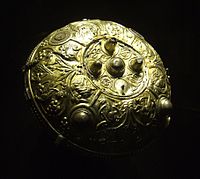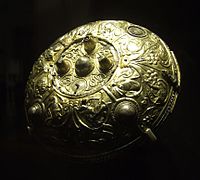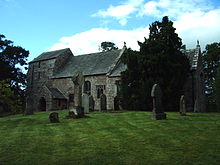- Ormside bowl
-
Ormside bowl
Images of the bowl on display in the British MuseumMaterial Silver and glass Height 45 millimetres (1.8 in)[1] Width Diameter 138 millimetres (5.4 in)[1] Created AD 750–800 Discovered 1823, Great Ormside, Cumbria Present location Yorkshire Museum Registration York Museums Trust 1990.35 The Ormside Bowl is an Anglo-Saxon double-bowl in gilded silver and bronze, with glass, perhaps Northumbrian, dating from the mid-8th century which was found in 1823, possibly buried next to a Viking warrior in Great Ormside, Cumbria, though the circumstances of the find were not well recorded. If so, the bowl was probably looted from York by the warrior before being buried with him on his death. The bowl is one of the finest pieces of Anglian silverwork found in England.[2]
Contents
Description
The bowl is a double-shelled cup made from 2 pieces riveted together with dome-headed rivets and beaded collars. The surface of the bowl is decorated with a chased repousse technique.[3] Sometime after it was originally made the bowl was converted into a drinking vessel.[4]
Inner Bowl
The inner cup is made from gilt-bronze[1] and is riveted with studs of blue glass and silver.[4] The base plate of the internal bowl features 16 circular pieces of glass within a ring of cloisons and five further rivets, of which the central is missing. The gilding on the bowl was added after the other decoration.[1] The inner bowl could have been made in York as a blue-glass stud matching the bowl's was found there.[5]
Outer Bowl
The outer shell is made from silver-gilt, the rim once had a U-sectioned strip of ungilded silver although this has now mostly been lost. This strip was originally attached using 4 clips in the shape of animal heads although 2 of these have also been lost.[1] The bowl's gilt-silver exterior is decorated with Anglo-Saxon style interlaced fabulous creatures amid Continental style vines,[6] the frontal gaze of some of the creatures on the bowl is a common occurrence in carvings of this type.[7] These decorations show plants, grapes, fruit, animals and birds in both naturalistic and grotesque style.[1] Another beaded band is riveted on in four places outside the rim. These rivets have square mountings, in one of which a piece of blue glass survives. The external base plate features five domed rivets. The interlaced cruciform decoration between these rivets has been made using a repoussé technique. The bowl may also once have had a footring made from gilded wire.[1]
Comparisons
The Ormside bowl is similar in aspects of its style to several bowls from the St Ninian's Isle Treasure but is closer in style to a lost early eighth century hanging-bowl found in the River Witham. The decoration on the bowl has been compared to the St Petersburg Bede, Barberini Gospels, Gandersheim Casket and Rupertus Cross.[1] The conical bosses on the base of the bowl resemble features of the Kildalton Cross.[8]
The embossed and fine-lined filigreed designs on the bowl have been compared to those of the Wye Down pendant and the Book of Durrow leading to it being dated in 1958 by G. Haseloff to 650–700,[9] though this now seems too early.
Discovery and Exhibition
The bowl was found buried in 1823 in what is now St James' Churchyard in Great Ormside. In 1898 the burial of a Viking warrior was found in the same churchyard. This burial, including a sword, is now in the Tullie House Museum and Art Gallery in Carlisle where it forms an important part of their early medieval collection.[10][11] [12]
David M. Wilson does not consider the bowl to have actually been buried with the Viking warrior, and instead assumes it was really found inside the church, as he considers the bowl to be too fragile to have survived burying.[1]
The bowl itself has previously been displayed in the Yorkshire Museum and was temporarily displayed in room 2 of the British Museum until 27 June 2010. This was the first time a regional museum has shown its collection at the British Museum and Margaret Hodge the Minister of State, Department for Culture, Media and Sport encouraged everybody to view the exhibit.[13] It returned to the Yorkshire Museum for its reopening on Yorkshire Day after a £2m refurbishment.[14] There is also a small exhibition about the bowl in St James' Church in Great Ormside.[11]
References
- ^ a b c d e f g h i Wilson, D. M. (2003). "Ormside Bowl". In Hoops, Johannes. Reallexikon der Germanischen Altertumskunde. 22. Strassburg: Walter de Gruyter. pp. 218–220. ISBN 3-11-017351-4. http://books.google.com/books?id=uxM5SZJHCpIC&printsec=frontcover&source=gbs_ge_summary_r&cad=0#v=onepage&q&f=false.
- ^ "Archaeology". York Museum website. York Museums Trust. 2006. http://www.yorkshiremuseum.org.uk/Page/ViewCollection.aspx?CollectionId=1. Retrieved 28 June 2010.
- ^ L E Webster and J Backhouse (1991). "'dumfriesshire'". ScotlandsPlaces. http://www.scotlandsplaces.gov.uk/search_item/index.php?service=RCAHMS&id=84867. Retrieved 28 June 2010.
- ^ a b Katie Marsden (2009-02-23). ""A Private Audience with the Cawood Sword and other Viking Treasures": A review of the talk at the Yorkshire Museum". The Post Hole (Issue 4). http://www.theposthole.org/read/article/28. Retrieved 24 June 2010.
- ^ Dominic Tweddle (June 2001). "The glory that was York". British Archaeology (Issue 59). Council for British Archaeology. http://www.britarch.ac.uk/ba/ba59/feat2.shtml. Retrieved 28 June 2010.
- ^ "Anglo-Saxon England and the Continent". worldtimelines.org.uk. The British Museum. 2006. http://www.worldtimelines.org.uk/world/british_isles/england/AD410-1066/continent. Retrieved 28 June 2010.
- ^ "Early Medieval Artefacts". Treasure Annual Report 2001. Department for Culture, Media and Sport. 2001. p. 43. http://webarchive.nationalarchives.gov.uk/+/http://www.culture.gov.uk/images/publications/Catalogpp041068.pdf. Retrieved 28 June 2010.
- ^ "Islay, Kildalton Chapel Burial Ground, Kildalton Great Cross". Scotland's national collection of buildings, archaeology and industry. Royal Commission on the Ancient and Historical Monuments of Scotland. 1 August 2007. http://canmore.rcahms.gov.uk/en/site/251204/details/islay+kildalton+chapel+burial+ground+kildalton+great+cross/. Retrieved 28 June 2010.
- ^ G. HASELOFF (1958). "Fragments of a bowl Hanging-Bowl from Bekesbourne, Kent and Some Ornamental Problems". Med. Archaeol. II. http://ads.ahds.ac.uk/catalogue/adsdata/arch-769-1/ahds/dissemination/pdf/vol02/2_072_103.pdf.
- ^ "Vikings in Cumbria". Tullie House website. http://www.tulliehouse.co.uk/node/504. Retrieved 24 June 2010.
- ^ a b "Great Ormside – St James' Church". Visit Cumbria. http://www.visitcumbria.com/pen/chp16.htm. Retrieved 28 June 2010.
- ^ "St James, Ormside". The Church of England. http://www.achurchnearyou.com/ormside-st-james/. Retrieved 28 June 2010.
- ^ Parliamentary Debates, House of Commons, 1 Mar 2010, column 652.
- ^ Steve Pratt (10:39am Tuesday 23rd February 2010). "A heritage to treasure". The Northern Echo. Newsquest. http://www.thenorthernecho.co.uk/features/5022865.A_heritage_to_treasure/. Retrieved 28 June 2010.[dead link]
External links
Categories:- Viking Age
- Anglo-Saxon art
- Silver-gilt objects
- Ormolu
Wikimedia Foundation. 2010.



